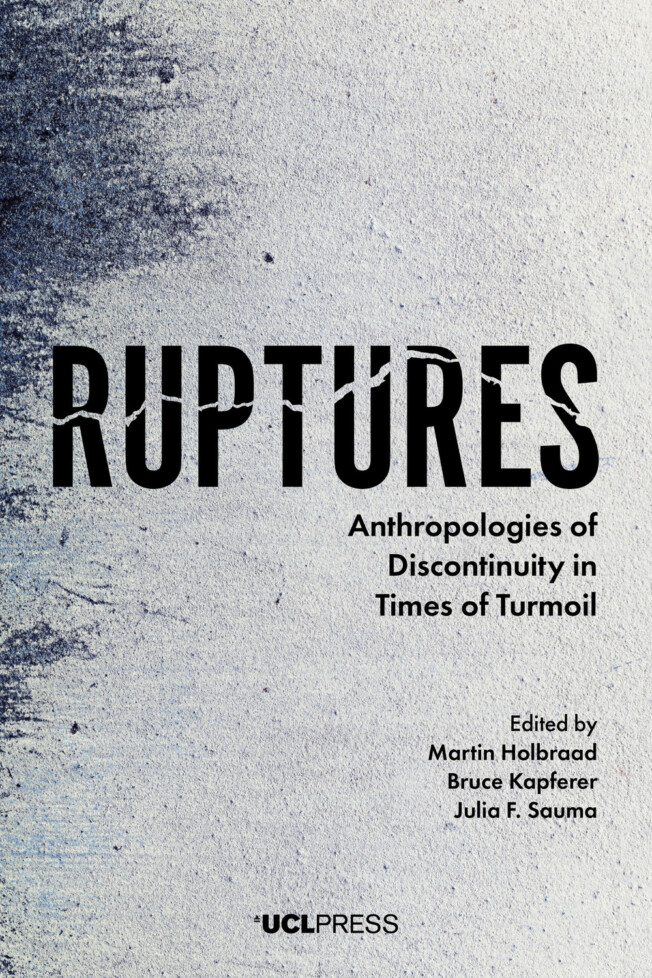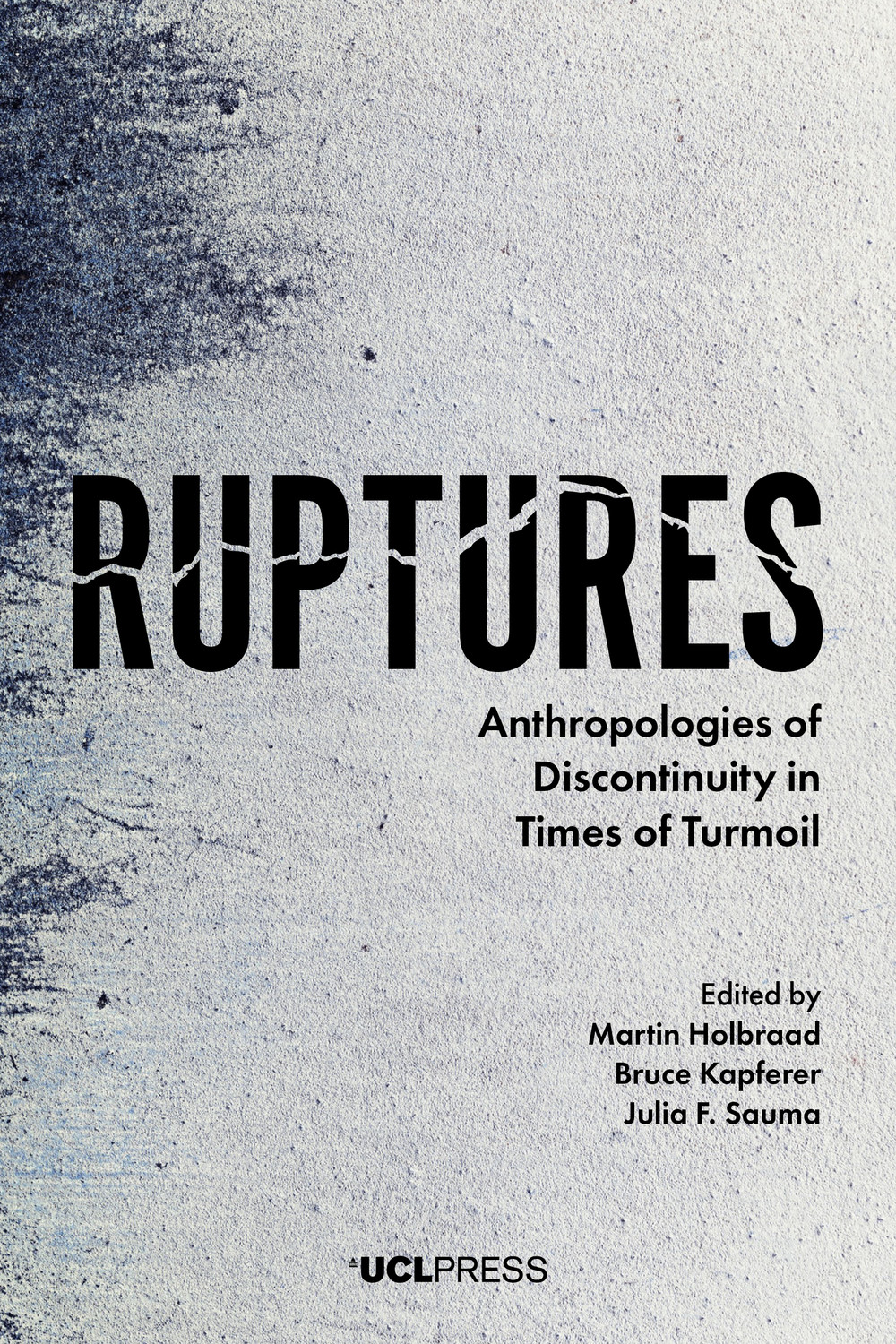
Ruptures
Anthropologies of Discontinuity in Times of Turmoil
Martin Holbraad (Editor), Bruce Kapferer (Editor), Julia F. Sauma (Editor)
Ruptures brings together leading and emerging international anthropologists to explore the concept of ‘rupture’. Understood as radical and often forceful forms of discontinuity, rupture is the active ingredient of the current sense of a world in turmoil, lying at the heart in some of the most defining experiences of our time: the rise of populist politics, the corollary impulse towards protest and even revolutionary change, as well as moves towards violence and terror, and the responses these moves elicit.
Rupture is addressed in selected ethnographic and historical contexts: images of the guillotine in the French revolution; reactions to Trump’s election in the USA; the motivations of young Danes who join ISIS in Syria; ‘butterfly effect’ activism among environmental anarchists in northern Europe; the experiences of political trauma and its ‘repair’ through privately sponsored museums of Mao’s revolution in China; people’s experience of the devastating 2001 earthquake in Gujurat; the ‘inner’ rupture of Protestant faith among Danish nationalist theologians; and the attempt ex nihilo to invent an alphabet for use in Christian prophetic movements in Congo and Angola.
Ruptures takes in new directions broader intellectual debates about continuity and change. In particular, by thematising rupture as a radical, sometimes violent, and even brutal form of discontinuity, it adds a sharper critical edge to contemporary discourses, both in social theory and public debate and policy.
Introduction: Critical Ruptures
Martin Holbraad, Bruce Kapferer and Julia F. Sauma
1. The Guillotine: Reflections on Violent Revolutionary Rupture
Caroline Humphrey
2. Rupture and Repair: A Museum of the Red Age Confronts Historical Nihilism
Michael Rowlands, Stephan Feuchtwang and Lisheng Zhang
3. Times Like the Present: Political Rupture and the Heat of the Moment
Carol J. Greenhouse
4. Inner Revolution: Reaction and Rupture in a Danish Lutheran Movement
Morten Axel Pedersen
5. Blurring Rupture: Frames of Conversion in Japanese Catholicism
Tobia Farnetti
6. Writing as Rupture: On Prophetic Invention in Central Africa
Ramon Sarró
7. Slow Rupture: The Art of Sneaking in an Occupied Forest
Stine Krøijer 8. The Rhythm of Rupture: Attunement among Danish Jihadists
Anja Kublitz
9. Earthquake Citizens: Disaster and Aftermath Politics in India and Nepal
Edward Simpson and Michele Serafini
Afterword: Some Reflections on Rupture
Joel Robbins
Index
DOI: 10.14324/111.9781787356184
Number of pages: 248
Number of illustrations: 8
Publication date: 25 June 2019
PDF ISBN: 9781787356184
EPUB ISBN: 9781787356214
Hardback ISBN: 9781787356207
Paperback ISBN: 9781787356191
Martin Holbraad (Editor)
Martin Holbraad is Professor of Social Anthropology at UCL and author of The Ontological Turn: An Anthropological Exposition (Cambridge, 2016, co-authored) and Truth in Motion: The Recursive Anthropology of Cuban Divination (Chicago, 2012).
Bruce Kapferer (Editor)
Bruce Kapferer is Emeritus Professor of Social Anthropology at the University of Bergen and Honorary Professor at UCL. His recent publications include 2001 and Counting: Kubrick, Nietzsche and Anthropology (Chicago, 2014) and Legends of People, Myths of State: Violence, Intolerance and Political Culture in Sri Lanka and Australia (Berghahn, 2011).
Julia F. Sauma (Editor)
Julia F. Sauma is Postdoctoral Research Fellow in Anthropology at the University of Bergen. She has published articles in Revista de Antropologia and Cadernos de Campo, and is currently preparing a monograph titled Collective: A Maroon Sociology.
Related titles
Revolution Beyond the Event
Charlotte Al-Khalili, Narges Ansari, Myriam Lamrani, Kaya Uzel,
02 May 2023
Ruptures
Anthropologies of Discontinuity in Times of Turmoil
for more info
Ruptures brings together leading and emerging international anthropologists to explore the concept of ‘rupture’. Understood as radical and often forceful forms of discontinuity, rupture is the active ingredient of the current sense of a world in turmoil, lying at the heart in some of the most defining experiences of our time: the rise of populist politics, the corollary impulse towards protest and even revolutionary change, as well as moves towards violence and terror, and the responses these moves elicit.
Rupture is addressed in selected ethnographic and historical contexts: images of the guillotine in the French revolution; reactions to Trump’s election in the USA; the motivations of young Danes who join ISIS in Syria; ‘butterfly effect’ activism among environmental anarchists in northern Europe; the experiences of political trauma and its ‘repair’ through privately sponsored museums of Mao’s revolution in China; people’s experience of the devastating 2001 earthquake in Gujurat; the ‘inner’ rupture of Protestant faith among Danish nationalist theologians; and the attempt ex nihilo to invent an alphabet for use in Christian prophetic movements in Congo and Angola.
Ruptures takes in new directions broader intellectual debates about continuity and change. In particular, by thematising rupture as a radical, sometimes violent, and even brutal form of discontinuity, it adds a sharper critical edge to contemporary discourses, both in social theory and public debate and policy.
